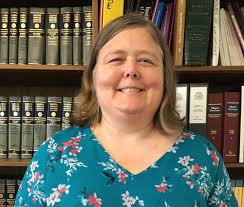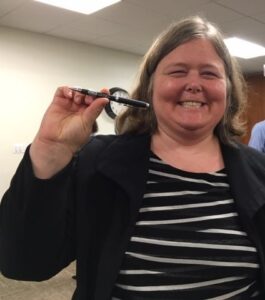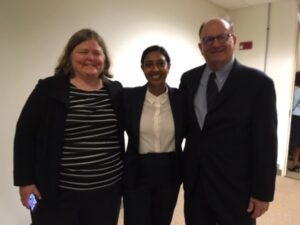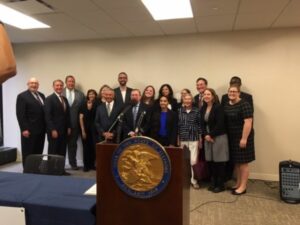Q&A with Ashlee Highland, CARPLS Supervising Attorney
By Nicole NeSmith, CARPLS Development & Communications Associate

Debt collection abuses are the leading cause for complaints to the Federal Trade Commission and Consumer Financial Protection Bureau. Nearly one in five Illinois consumers have debt that is in collections.
On July 29, 2019, Illinois Governor J.B. Pritzker signed into law the Consumer Fairness Act (HB88), which aims to combat some of the archaic and unfair consumer collection laws that disproportionately affect communities of color and women.
We see this trend represented in CARPLS’ own client base. In FY19, nearly 20% of our services were in consumer law.
Of these clients, many are disproportionately poor, minorities and women:
- 40% of clients were below 150% of the Federal Poverty Level
- 80% were African-American or Latino
- 57% were women
The new law, which takes effect on January 1, 2020, will drop post-judgment interest rates from 9 percent to 5 percent on consumer debt judgments of less than $25,000 and will shrink the judgment collection time window from 26 years to 17 years.

Most people in collection courts have no representation. Most often, they want to make good on their debts, but the existing law made that close to impossible and put debtors further behind. The Consumer Fairness Act is an important step towards helping families get out of debt and build financial security.
Ashlee Highland, CARPLS Supervising Attorney, runs our Consumer Collection Desk in Courtroom 1401 at the Daley Center and was an active participant on the ad hoc committee that worked over two and half years to convince the Illinois legislature to lower the punitive interest rate. In this interview, Ashlee shares a behind-the-scenes look at how the Consumer Fairness Act came to pass.
Who else served on your committee to develop the Consumer Fairness Act?
We had a great group of people:
- Illinois House Representative Will Guzzardi, 39th District
- Former Majority Leader of the Illinois House of Representatives Barbara Flynn Currie, 25th District
- Illinois State Senator Iris Y. Martinez, 20th District
- Former Illinois House Representative Elaine Nekritz, 57th District
- Melissa Wemstrom and Ashlee Highland, CARPLS
- Caroline Manley, Center for Disability & Elder Law (CDEL)
- Veda Dmitrovich, Caroline Simon and Avani Kamdar, Chicago Legal Clinic
- Matthew Hulstein, Chicago Volunteer Legal Services
- Judge Thomas More Donnelly, Circuit Court of Cook County
- Jody Blaylock, Heartland Alliance
- Jeff Colman and Vaishalee Yeldandi, Jenner & Block LLP
- Steven F. Pflaum, Neal, Gerber Eisenberg LLP
- Heather Wier Vaught, Heather Wier Vaught P.C.
- Kevin Herrera, formerly with Sargent Shriver National Center on Poverty Law
How did the Consumer Fairness Act come about?
A lawyer from the private bar, Jeff Colman, recruited me in early 2017 saying he wanted to do something about the interest rate because it was so high. He became interested in the issues through his involvement with the Access to Justice Commission of the Illinois Supreme Court.
I had been working at the CARPLS collection desk since 2006 and I constantly have to tell clients that unfortunately: 1) the law allows creditors to get 9% interest on their judgment 2) that the judgment is good for a long time, up to 26 years, and 3) they can continue to collect on you at that 9% interest. I jumped at the chance to be involved and try to change the law.
In early 2017, Jeff Colman contacted Rep. Currie, who was the majority leader for the House of Representatives, and Former Rep. Nekritz. We presented the idea of decreasing the interest rate, because it had stayed at the same level since the 1980s, a time when interest rates were really high (not because the rates were punitive then—everything was just high at the time and the economy was at a different point).
What were Rep. Currie’s and Nekritz’s first impressions?
They suggested that we should come back with a wish list of what we wanted to change. We got the Chicago legal aid community behind the idea and we came up with six bills to present in subject hearings to the Civil Judiciary Committee of the House of Representatives in April 2018. Rep. Currie was about to step down that year, so Rep. Will Guzzardi took over the chief sponsorship of these bills. After the hearing, our committee went back to work and streamlined all six bills into one to be presented in 2019. He was joined on the Senate side by State Senator Iris Martinez.
How did you get the bills to go from six to one?

We had a strategy meeting at the end of 2018 and that’s when we came up with the Consumer Fairness Act. Before we could get it passed with the house, we met with the Illinois Creditors Bar Association and the banking industry and negotiated the interest rate from 9% to 5% for judgments under $25,000.
How did you decide on that judgment amount?
We were modeling our statutes on other states, and Minnesota uses $25,000 as their threshold. We wanted the judgment amount to cover mostly consumer law and collection cases—the kinds of cases where credit card debts are being bought up for pennies on the dollar. Most of the time the consumer falls behind for a lot of different reasons, such as high medical debt or losing a job. Then they are often sued, usually not by the original creditor. The collectors tend to sit on these judgments for years, allowing the interest to build. Then, many years later the companies try to collect on the judgment interest and our clients have no idea who these companies are and sometimes don’t even know the debt being referred to.
So the interest can accrue before the client/debtor even finds out about it?
Yes. They’re supposed to have been served before a judgment is entered against them, but sometimes the person isn’t personally served for various reasons. But again, it’s in the collection companies’ interest to sit on the debt because it keeps accruing interest. A lot of times people come to us because of wage garnishments on very old judgment—a recent one I remember was from 2003.
How are companies able to file and get approved for wage garnishments without a client being notified?
Creditors will often sell the debt to collection companies who will sell it to other companies and so on. Although the consumer was supposed to be served with the complaint and summons before the judgment was entered, the creditor only has to mail the wage garnishment notice to the last known address of the debtor—they do not have to serve them. Often the only way clients find out about the debt collection judgment is when their employers tell them. Same thing for when their bank account is frozen, the bank tells them.
Some people don’t realize that just because a judgment doesn’t show up on a credit report, it doesn’t mean that collection companies can’t go after their debt. They don’t understand how the amount owed on a judgment can double in 10 years because of the interest. On a daily basis the judges in the post judgment courtroom have to tell debtors that the law allows plaintiffs to obtain this high interest. And, most of the time our clients are representing themselves and have trouble negotiating a fair payment plan with the other side’s attorney.
Was it difficult to negotiate with the opposition?
Yes, it was an intimidating process. There was this sense when we started working on the bills that people typically get things passed by making deals based on other bills they are negotiating. Since most of us on the committee were legal aid or private advocates, we did not have other bills we could use as leverage.
We also had meetings with the City of Chicago to see if they would support or oppose our efforts. And, we met with the Creditors Bar and other constituents.
Ultimately, we were able to come to an agreement of a 5% interest rate on consumer judgments at a max of 17 years.
Do you have a sense of how many people this will help?
Illinois has one of the highest rates of wage garnishment in the United States. 80-90% of collection cases are under $25,000 judgments. We’re talking about a lot of medical and credit card debt.
A few months back, I invited several clients to consider sharing their consumer debt collection cases with a journalist for an article. So many of the people I talked to wanted the law changed, but no one felt comfortable enough talking about their legal woes or debt publicly. Their stories were relatable, like loss of income or sickness/death in the family. I saw this affecting men, women, elderly, minorities, and the poor and vulnerable. A lot of people might think on the surface, ‘well, why didn’t they just pay their credit card debt,’ but they don’t realize that people were often robbing Peter to pay Paul. Many had gotten payday loans to buy groceries, for example, or they were using money to pay rent so they weren’t evicted. When they ultimately ended up in court due to collection judgments, many were representing themselves and the cards were stacked against them. This Act doesn’t change everything, but it’s something and it’s a good start.

What have you learned from this experience? What does this mean for the services you deliver through CARPLS?
I am very proud of my work on the Consumer Fairness Act, because I have seen numerous clients struggling to pay back consumer judgments at an extremely high interest rate. It was an honor to work on the solution to that problem with a coalition of talented individuals. I would like to give a shout out to Vaishalee for keeping us organized, to Jody, Heather, and Kevin for their lobbying efforts, and to Judge Donnelly in sharing his firsthand experience with this issue.
I have learned that getting involved in the legislative process can effect change on issues that affect so many. It was so eye opening to learn how a law is made from a bill into a reality.
Ashlee Highland is a Supervising Attorney at CARPLS Legal Aid. She is a 1994 graduate of Indiana University – Bloomington and a 2000 graduate of Chicago Kent College of Law. Between college and law school, Ashlee was a United States Peace Corps Volunteer in Botswana, Africa. Upon graduation from law school, she worked as staff attorney at Legal Assistance Foundation (now known as Legal Aid Chicago) from 2000 to 2005. Since 2006, Ashlee has managed the CARPLS Collection Court Advice Desk in Courtroom 1401, where CARPLS staff and volunteers help self-representing litigants navigate collection cases. She is also responsible for all consumer law content for the hotline.

